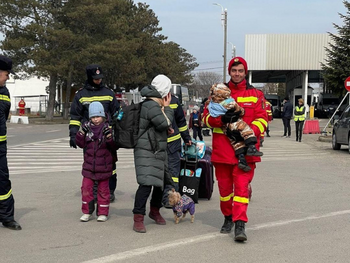University News Last updated 04 January 2023

Birmingham City University (BCU) student, Andy Stanciu balanced his studies with volunteering as a paramedic at the Romania-Ukraine border back in March 2022 as he helped thousands of refugees fleeing from the war with Russia.
Stanciu, now in his final year of BA Policing and Investigations Studies at BCU, spent time working as a first responder for the Romanian fire department before moving to England to begin his studies at BCU in 2020.
When Russia invaded Ukraine in February 2022, Andy was called back to the Romanian border town, Siret, as a first point of contact for Ukrainian refugees fleeing the horrors of the war.
“I’ve seen a lot as a Paramedic, but what I saw on the border will stay with me. I want to help people, and this is my way of being able to do that,” he said.
“When I was a kid, I was afraid of blood and needles, but one day I just told myself if I want to get over this fear, I should try volunteering I ended up l loving it then I became a paramedic and did some courses to become a firefighter.
When Andy was called to the border in March 2022 to assist with the refugee efforts he didn’t hesitate to help.
“There were doctors, vets, child protective services, military, secret services, and welfare officers all working together to help. The team was fantastic and we instantly bonded.”
Much of Andy’s work on the border was as a first point of contact for refugees fleeing the war and he witnessed the joy and relief some Ukrainians felt as they arrived at the border, he also saw many refugees who were traumatised as well.
“People were so happy to be in Romania; a country that wasn’t going to harm them. People would hug me and cry,” he said.
“However, some were coming in injured and sick. They had nothing on them, sometimes a passport but many didn’t have documentation. They were forced to run and leave everything behind. It was pretty tough.
“A lot of people were in pain; emotional pain is well. Families that were separated, as the fathers were fighting in Ukraine. It was traumatic seeing children travelling alone. One day I had a group of 17 or 18 kids crossing the border, all aged between six and 15 years old. That was a horrible day for me.”
During his time at the border, there was one child, a six-year-old boy, that really stuck out to him.
“A kid came in alone. He was six years old. He didn’t speak English, so I asked a Ukrainian woman from Child Protective Services to help. He was torn up; his clothes were ripped. He had been away from home for three or four days and had walked to the border on his own.
“I went and got him some clean clothes. We got a t-shirt out and went to change him and there was his name, date of birth, address, blood type, and name and phone number of his parents written in permanent marker on his back, on his skin.”
“I’ll never not see that. It was a tough moment. Fortunately, she picked up the phone, and we assured her that her son was ok and was going to be placed with a great family.
“She just started crying down the phone. It was an emotional moment. I couldn’t stop thinking that kid may not see her again.”
Stanciu spent just over a month at the border before returning to the UK and picking back up his studies at BCU.
After what he experienced at the border in Romania Stanciu is keen to remind everyone that the realities of war are different from what they see on TV.
“Not everything that you see on screen is exactly how you see it in reality. There is a lot of fake propaganda out there to influence both sides.
“It was a big operation and everyone was trying to help, we made huge efforts to keep everything in order and aid refugees as best we could.”
“I’ve seen people harass refugees for not staying and fighting. The emotional damage that it causes is horrible. Put yourself in their shoes, I heard people outside of Ukraine saying they would stay and fight, but they’re not in a war zone. We would all be terrified in their situation.
“We need to help them feel safe, to encourage them that everything is going to be alright.”
One of the best ways to help with the humanitarian effort and help Ukrainian refugees according to Stanciu is to support charities as he has seen the vital work they are doing.